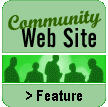postnet.com Community Web
Sites
Election Pages
A quick civics quiz: Who picks the
frontrunning candidates, the issues and the
questions to be asked and answered in an
American election year? If you said "the
public," put your high-school textbook back in
the bottom drawer and look around you. This year
the frontrunners for the presidency were named
before you were ever consulted, and it's been
campaign managers, big-money donors and the news
media (including the Post-Dispatch and
postnet.com) who've been setting the tone ever
since. Why? The reason isn't necessarily dark
and conspiratorial so much as matter-of-fact:
They're better organized.
This year we're enlisting our Community Web
Sites network to help the public become
better organized. We've asked the community
groups in our network to create Web pages
expressing their own perspectives and questions
on this year's elections, as a way of letting
St. Louisans consult with one another on the
issues before them. What issues ought we to be
talking about? How should the news media be
covering them? What effect will the election of
a Democrat, a Republican or a third-party
candidate have on the work of St. Louis-area
organizations? Here's what our network had to
say -- and check back again, as more listings
may still be added before Election Day:
  GAP BETWEEN RICH AND
POOR GAP BETWEEN RICH AND
POOR
Institute for Peace and
Justice: Closing the Gap
Faith leaders have been sharing opinions
on what constitutes economic justice. Here they
share them with you.
PAKT Community Resource
Center: The View from
Kinloch
Forty-nine percent of Kinloch's
households live below the poverty level. Money
to help them through a bad month is hard to come
by, and three out of four must be turned away.
St. Louis Area
Foodbank: Politics and Hunger
Learn about hunger in Missouri, and
about the policies and politics that maintain it
and those that might reduce it.
Human Rights
Office: 10 Questions for the
Campaign
Catholic bishops ask basic questions
about economics, mutual responsibilty, family
and other issues. Follow the links to their
statement.
Center for Women in
Transition: Sentencing
Disparities
Crime is dropping but we continue to
incarcerate. This has a tremendous impact on
families, especially children. What's the
alternative? Restorative
justice.
Tech Corps
Missouri: Earn a Computer
Wealthy and poor children have equal
access to computers in school, but not in the
home. Still, there are ways to overcome this
digital divide.
 EDUCATION, CHILDREN
AND FAMILIES EDUCATION, CHILDREN
AND FAMILIES
St. Louis Dietetic
Association: Food Assistance and School
Lunches
Where the candidates stand on child
nutrition, and a long-range view of what America
should do to improve it.
Children's Rights
Council: The Best Parent is Both
Parents
Divorce may be unavoidable, but children
have the right not to be used as pawns. Follow
the "Issue Week" links to learn how to remain
collaborative parents even after separation.
  AMERICA'S ROLE IN THE
WORLD AMERICA'S ROLE IN THE
WORLD
American Legion,
11th/12th District: Military Policy through Veterans'
Eyes
A collection of articles on the state of
the U.S. military and veterans issues, including
statements by George Bush and Al Gore and the
results of an online poll of veterans.
Ethiopian Community
Association: Issues for Naturalized
Voters
Welfare reform at home and activism in
fostering peace and prosperity abroad in their
home countries top the list of concerns for
immigrants and their families.
 THE
ENVIRONMENT THE
ENVIRONMENT
Sierra
Club: Candidate
Checklists
The front page tells you who the Sierra
Club thinks an environment-minded voter should
vote for; the link at the bottom leads to pages
that tell you why.
Missouri
Environmental Fund: Three Propositions
A few thoughts about three state and
local choices on your ballot, and Web sites you
can go to for really detailed information.
St. Louis Earth
Day: Environmental Voters
Guides
Links to three Web sites geared to help
environmentalists think through their vote
(including the Missouri Environmental Fund's).
OTHER
ISSUES
The Archdiocese of
St. Louis: Faithful
Citizenship
Catholic teaching on following the
guidance of Gospel to shape a society more
respectful of human life and dignity.
Society of Children's
Book Writers and Illustrators, Missouri
Region: Our Say
Missouri's authors and illustrators have
their say about the year 2000 elections.
Community Living,
Inc.: Stand Up and Be
Counted
Information and Links for YOUR Decision
2000.
|





 GAP BETWEEN RICH AND
POOR
GAP BETWEEN RICH AND
POOR
 EDUCATION, CHILDREN
AND FAMILIES
EDUCATION, CHILDREN
AND FAMILIES

 AMERICA'S ROLE IN THE
WORLD
AMERICA'S ROLE IN THE
WORLD
 THE
ENVIRONMENT
THE
ENVIRONMENT